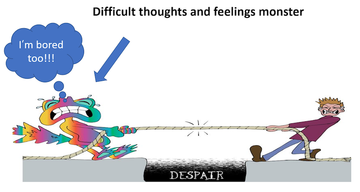Before you watch this webinar
Enhancing your learning experience begins with understanding you better. Collecting data enables us to tailor our educational content specifically for our audience. Discover more about how we handle your information in our Privacy Policy.
Event
Alzheimer’s disease & dementia – Care and support in a COVID-19 world: Supporting the mental wellbeing of dementia clinicians
Aim
- To provide practical advice for the mental well-being of dementia nurses and clinicians
Summary
Practical advice
Jo Johnson, consultant neuropsychologist and author of ‘Surviving Me’, shared some useful tips for building mental resilience and developing a strong, healthy mind during this pandemic and beyond.
Jo's slides
Know your values
Knowing your personal values – what you feel strongly about – makes you far more capable of managing a whole range of physical and mental challenges in times of crisis. Jo noted that all values can be expressed in an action, and that following your values takes you more towards the person you want to be and what we feel is important.
If you knew you were being filmed at the moment, and that the video would be played back to you in time to demonstrate the version of yourself that you most like to be…
- How would you spend your time?
- How would you treat those around you?
- What would you be saying, and to whom?
- Who would you be calling, face timing, and spending time with?
- How much would you be moving?
- What would you stop doing?
- What would you be putting in your mouth?
Jo says that answering these questions helps to identify our personal values. We can then notice when we are acting in ways that take us towards those values, and towards the person we want to be, or away from them. Jo shared that the more our actions carry us towards our values, the better our mind’s health is.

Figure 1: the two gears of the mind (slide taken from webinar)
Our mind’s two gears
Jo advocates considering the two ‘gears of the mind’ (fig 1), and notes that both gears are important, and both are needed in different scenarios.
She highlights that ‘thinking gear’ is essential for thinking things through, planning, remembering, and such. However, by staying in it all of the time, that can lead to stress, anxiety and sleeplessness. Often our ‘thinking gear’ can take us away from our values and the actions we want to take to be more ourselves.
‘Sensing gear’ is when we are in the present, experiencing our current situation, calling on our senses, and just ‘being’. When we are in ‘sensing gear’ we notice our thoughts, notice how we feel, and can make better choices about what we do as a result of them. Learning to get back into ‘sensing gear’ more often allows us to make choices that take us further towards the person we want to be, or actions that are more in line with our values.
When we are in the wrong gear it can cause problems. Being in thinking mode when we are trying to engage in a relationship, or to take some time for ourselves in exercise, it can give us a feeling of restlessness or agitation. Jo described it as ‘having too many windows open on your computer’ when you are trying to focus on one thing only.
Being present
When we think about what happened earlier in the day, the week, or the year, dwelling on problems that occurred, events that cannot be changed or regrets we have, Jo describes it as getting into your ‘mind tardis’. Thinking about the dinner that needs planning, what happens when lockdown ends, how to manage a difficult event coming up, and so on, means looking to the future. This is also getting into a ‘mind tardis’.
When you are in your ‘mind tardis’, you are not able to enjoy your time at the given moment. You may have missed truly listening to your patient in a consultation, missed a discussion with a loved one who was trying to confide in you, or missed an opportunity to take some valued time to yourself.
Mental sit-ups
At a time when body image is so important and having a ‘strong core’ is essential, Jo describes our mental fitness as a poplace as being ‘flabby’ with poor ‘mental cores’. However, we can all do mental sit-ups, regularly, and the more we do them, the easier they get and the more mentally fit we become.
Ideas for how to do ‘mental sit ups’ include:
- Having specific cues to trigger consciously getting into sensing mode. For example, when taking a shower, washing your hands, doing the washing up. Every time you try to do this, it is another ‘mental sit up’.
- Make a ‘pod’ – take a brief pause and observe your own body, then your mind and your thoughts. Connect to your body and have a stretch, before refocusing on whatever you are in the middle of.
- Mindfulness apps like Calm or Headspace
Engaging with your emotions
Jo talks about the struggle with our feelings of anger or upset, and how we often grapple with them, trying to fight them and getting ‘hijacked’ by them. She points out that when we focus on them, choosing to acknowledge them and then let them go, you choose to stop fighting, ‘drop the rope’ and move on.

Fig 2: ‘Drop the rope’
Considering how to ‘drop the rope’ on our darker thoughts is important. Jo encouraged an exercise to help us to confront our uncomfortable, embarrassing, or frightening feelings.
- Write down your darkest thought or fear.
- Write before it ‘I’m having the thought that…’
- Now write, in front of that, ‘I notice that…’
- Repeat the whole string of words a few times over out loud, or in your heads.
- Notice how you feel about that initial thought or fear. Does it give them context? Help them to feel more manageable?
We tend to have a dark thought, and do not want to think about it, so we expend a lot of energy trying to push it away, or avoid it in some way, often with the same activities, such as exercising, eating or shopping. By acknowledging those thoughts, and accepting that we have them, they are less likely to drive us to the actions that often are our default escape route – and which often take us away from our personal values.
Another way to ‘drop the rope’ is to ignore negative thoughts that drag you into the past or the future. We can choose to listen to the inner dialogue we have which is negative about ourselves, or dwells on moments of failure, guilt, embarrassment. Alternatively, we can notice it and say how ridiculous it is, or how pointless it is to listen to that voice in this moment.
Jo highlighted a short video by Dr Russ Harris called ‘the struggle switch’ and recommended it to all those at the webinar. (Dr Harris also has a short video specifically about how to ‘FACE COVID’.)
Additional resources and support
Dr Clara Domínguez Vivero provided a brief overview of some of the most useful resources available on mental wellness and supporting mental wellbeing during COVID-19.
Clara's slides
All links and resources in this document are available below
- mentalhealthatwork.org.uk
- Academy of Medical Royal Colleges: COVID-19 – Mental health & wellbeing for healthcare professionals
- Mental Health Foundation of New Zealand – Getting through together: Workplace wellbeing during Covid-19
- Canadian Society of Physician Leaders
- Royal College of Physicians of Edinburgh: Wellbeing & Support for Physicians
- Intensive Care Society: Wellbeing Resource Library
- Royal College of Physicians and Surgeons of Glasgow: Little Book of Wellbeing
- UCL Institute of Mental Health: Coping with stress associated with COVID19: advice to hospital staff (video below)
- The Faculty of Intensive Care Medicine, Intensive Care Society, Association of Anaesthetists and Royal College of Anaesthetists
- Royal College of Psychiatrists: Managing stress and avoiding burnout
- Nursing and Midwifery Health Program Victoria
- American Association of Nurse Anaesthetics
- secondvictim.co.uk
- frontline19.com
- Every Mind Matters
Our Dementia COVID-19 webinars are available on SoundCloud:
soundcloud.com/neurologyacademy
Were you registered on this course?
Log in to access resources..
LoginPromoting prevention, supporting management
Led by proactive clinicians determined to see improvement in the way we prevent, diagnose and manage dementias, Dementia Academy supports healthcare professionals with the latest tools, resources and courses to do just that.

